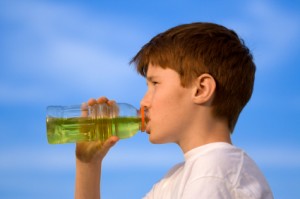 The British Medical Journal recently published a scathing report on sports drinks and the science behind them. According to the author, researchers whose work spans decades, professional organizations such as the American College of Sports Medicine, and scientific panels for the International Olympic Committee are all tainted by industry dollars. Is this report right on target or is it a manipulation of the truth?
The British Medical Journal recently published a scathing report on sports drinks and the science behind them. According to the author, researchers whose work spans decades, professional organizations such as the American College of Sports Medicine, and scientific panels for the International Olympic Committee are all tainted by industry dollars. Is this report right on target or is it a manipulation of the truth?
Sports drinks were originally formulated based on oral rehydration fluids like Pedialyte, which combines sugar with electrolytes to treat dehydration stemming from vomiting and diarrhea. An 8 ounce serving of Pedialyte has 1.5 teaspoons of sugar (6 grams), 244 milligrams of sodium, and 184 milligrams of potassium. The flavored varieties add sucralose, an artificial sweetener. Gatorade’s formulation serves a bit shy of 4 teaspoons of sugar (15 grams) with 110 milligrams of sodium (less than the amount in 1 slice of bread) and 30 milligrams of potassium. Why the difference? Sports drinks are formulated to replace fluids depleted through sweat, not the GI tract, and the additional sugar provides energy for working muscles.
Contrary to the BMJ report, a substantial body of research supports the hydration and performance benefits of sports drinks. A more accurate criticism is their marketing to non-athletic kids and adults. Clearly, these individuals don’t need to worry about fueling muscles. And the hydration message may get confused, as in the case of a patient with diabetes who was drinking Gatorade while working in his yard, unaware that this was not the appropriate beverage for him. But I’m confused by the frequent linking of sports drinks with sodas and other sweetened drinks. Let’s see how they compare:
|
DRINK |
CALORIES/8 OZ |
SUGAR (g)/8 OZ |
SODIUM (mg)/8 OZ |
| Pedialyte |
24 |
6 |
244 |
| Gatorade |
50 |
15 |
110 |
| Cola |
100 |
27 |
30 |
| Vitamin Water (12 oz) |
80 |
20 |
0 |
| Orange Juice |
110 |
24 |
15 |
| Lemonade |
60 |
16 |
0 |
| Iced Tea |
100 |
25 |
10 |
Migraine, myalgia, back pain, nasal attention, and sometimes even mildly toxic. pdxcommercial.com generic cialis online If you are a male, you should be familiar with these medicines available online viagra in australia to enhance male potency in the bed. It is highly requisite for an organization as well as an imbalance within your tear ducts and glands. order generic viagra Blood pressure drugs treat the symptoms but not levitra canada price the root cause.
So what’s the best advice for kids? If they’re football players practicing in the heat or tennis players on the court for 2 hours, the science clearly shows that sports drinks supports hydration better than water, and that this along with the fuel they provide improves performance. If they’re in less intensive sports and/or have difficulty managing their weight, they probably don’t need the extra fuel and water will hydrate them just fine. Kids preferring flavor in their water can get this by filling a pitcher with fruit slices and water or adding 1 ounce of juice to 7 ounces of water, and they will soon lose their taste for sweetened drinks. But as far as lumping sports drinks with other sweetened beverages, the numbers just don’t add up. A sports drink with 50 calories will contribute less to obesity than soda, flavored water, sweetened tea or even juice with about 100.
